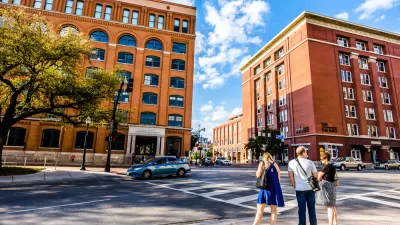A City Council committee got its first look at a proposed revision of the streetscape licensing process by which restaurants and cafés can acquire sidewalk seating. Councilmembers sent the plan back the drawing board again.
Last year, the Dallas City Council asked planners to rethink the city’s “streetscape licensing” process, especially the onerous fees that were required of any restaurant or café hoping to go al fresco.
Under a proposed revision, reviewed this week by the City Council's Economic Development Committee, “there would be a two-year pilot program during which businesses would be charged one-time ‘streetscape license fee’ of $250 for sidewalk cafes, awnings, sidewalk retail, and the like. Sidewalk cafes would be charged an additional annual fee of between $300 and $1,000 depending on the number of tables and chairs. These would have to comply with to-be-determined ‘sidewalk cafe standards,’” according to a report by Eric Nicholson.
Councilman Scott Griggs did not react well to the lingering presence of fees: "It's anti-urban -- and I also think it's anti-free market -- to charge all these fees."
“By the end of the meeting, a loose consensus had emerged around a one-time, $250 streetscape fee and minimal regulations. Council members instructed [city planner] Cossum to come back with a streamlined proposal.”
FULL STORY: Dallas Is Trying to Not Kill Sidewalk Cafes, But Old Habits Are Hard to Break

Maui's Vacation Rental Debate Turns Ugly
Verbal attacks, misinformation campaigns and fistfights plague a high-stakes debate to convert thousands of vacation rentals into long-term housing.

Planetizen Federal Action Tracker
A weekly monitor of how Trump’s orders and actions are impacting planners and planning in America.

In Urban Planning, AI Prompting Could be the New Design Thinking
Creativity has long been key to great urban design. What if we see AI as our new creative partner?

King County Supportive Housing Program Offers Hope for Unhoused Residents
The county is taking a ‘Housing First’ approach that prioritizes getting people into housing, then offering wraparound supportive services.

Researchers Use AI to Get Clearer Picture of US Housing
Analysts are using artificial intelligence to supercharge their research by allowing them to comb through data faster. Though these AI tools can be error prone, they save time and housing researchers are optimistic about the future.

Making Shared Micromobility More Inclusive
Cities and shared mobility system operators can do more to include people with disabilities in planning and operations, per a new report.
Urban Design for Planners 1: Software Tools
This six-course series explores essential urban design concepts using open source software and equips planners with the tools they need to participate fully in the urban design process.
Planning for Universal Design
Learn the tools for implementing Universal Design in planning regulations.
planning NEXT
Appalachian Highlands Housing Partners
Mpact (founded as Rail~Volution)
City of Camden Redevelopment Agency
City of Astoria
City of Portland
City of Laramie





























